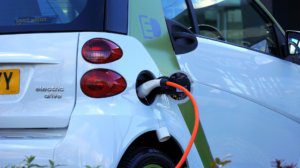
Primary registrations of electric cars (new and used) in Ukraine in January-October 2018 grew by 89% year-over-year, to 4,214 cars, the Ukrautoprom association has reported.
The share of used cars was 85% – the same as last year.
The Nissan Leaf remained the most popular make in Ukraine: 403 cars of this model were registered in Ukraine in October 2018. The BMW i3 with 38 cars ranked second in terms of the number of registrations and Tesla Model S was third with 27 cars. Renault Zoe (24 cars) was fourth, and FIAT 500е with 23 cars was fifth.
The top ten on the primary market of electric cars in October 2018 also included: Volkswagen e-Golf (19 cars), KIA Soul EV (18 cars), Hyundai Ioniq Electric (15 cars), Mercedes-Benz B-Class Electric Drive (14 cars), and SMART Fortwo ED (13 cars).
In 2017, the primary market of electric passenger cars in Ukraine grew 2.3-fold, to 2,697 units, and the share of used cars was 85%, while in 2016 – 51%.
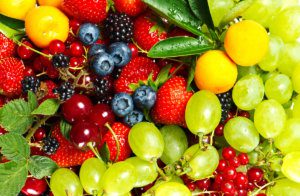
Ukraine in January-September 2018 exported fruits and berries in the amount of $157 million, which is 40% more compared to the same period last year. According to the Ukrsadprom association, the main products in this group were walnuts, which were delivered for $69 million, frozen fruits and berries worth $61 million, apples and pears for $10 million.
“The growth in exports of walnuts (from 13,000 tonnes in the first nine months of 2017 to 20,000 tonnes in the same period of the current year), apples and pears (from 9,000 tonnes to 29,000 tonnes respectively) was the most notable in natural terms,” according to the website of the association.
The main sales market remained the European Union, supplies to which bring about two-thirds of all foreign exchange earnings. In January-September 2018 the largest purchases of fruits were made by Poland ($32.3 million), France ($11.7 million), Belarus ($10.9 million), Turkey ($10.6 million), the Netherlands ($8.8 million), Germany ($7.4 million), and Italy ($7.2 million).
“If not to take into account imports of exotic fruits to Ukraine (mainly citrus fruits and bananas), for the three quarters of 2018 the surplus of foreign trade in fruits and berries reached $75 million,” the association said.
Ukrainian apples are exported to more than 50 countries, while they are mainly purchased by Belarus (43%), Moldova (20%), and Sweden (10%).
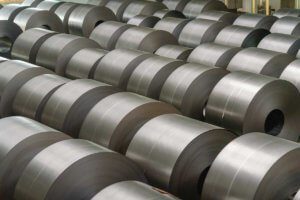
Ukrainian enterprises increased the consumption of rolled metal by 4.64% in January-August 2018 compared to the same period of 2017, to 3.138 million tonnes.
According to statistics released by the Ukrmetallurgprom association, in January-August 2018, 948,500 tonnes were imported.
“In January-August 2018, the growth of metal consumption in the domestic market amounted to 4.64% compared to January-August 2017, with the outpacing growth of the import component (14.62%),” the association said in a press release.
According to the Ukrmetallurgprom, over the eight months ending August 2018, Ukrainian metallurgical enterprises produced 12.27 million tonnes of rolled metal products (104% compared to the same period in 2017, taking into account the activities in non-government controlled areas, or 108%, without taking them into account in January-February 2017) of which, according to the state-owned enterprise Derzhanalitinform, about 10.1 million tonnes or 82.2% was exported. This is slightly higher than in the same period in 2017, the share of exports in which amounted to 81.6% (9.62 million tonnes, with a total metal production of 11.79 million tonnes).
The share of semi-finished products in exports for the eight months amounted to 43.94%, which exceeds the figure for the period January-August last year (39.83%).
The main export markets of Ukrainian metal products in January-August 2018, according to Derzhanalitinform, are the countries of the European Union (33.4%), Africa (16.9%), other European countries, including Turkey (13.5%) and countries of the Middle East (11%).
Among metallurgical importers in January-August 2018, the first place is occupied by the CIS (56.6%), the second is shared by Asian countries (18.7%) and the European Union (18.3%).
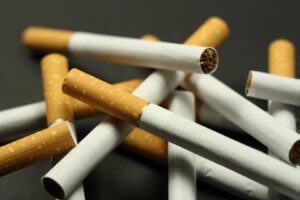
The total volume of the cigarette market in Ukraine in January-June 2018 narrowed by 11-12% year-over-year, JTI Ukraine General Manager Paul Holloway has said. “The Ukrainian market has decreased by 11-12% compared to 2017. If in 2016, price wars were observed in Ukraine, then in 2017 the industry left them, and now the situation in this sense is more or less stable. But there is a question of purchasing power of a Ukrainian consumer,” he said in an interview with Interfax-Ukraine.
Holloway said that now the Ukrainian consumer spends on average 21% of his daily income on cigarettes. “For comparison: this is more than in the U.K., where the consumer spends on them 15% of his income,” the general manager said.
According to JTI Ukraine estimates, the share of the premium segment in Ukraine is 13%, and more than 70% of the Ukrainian cigarette market is the low-price segment, which reflects the purchasing power of consumers.
“At the same time, Winston is the fastest-growing brand on the market. It does not belong to the low-price segment. Despite the fact that the low-price segment dominates on the market, there is still room for growth in the high-price segment. We do not expect the ratio of the low-price segment to other segments to change over the next two to three years,” Holloway said. According to him, now the company is actively discussing plans to bring brands to the Ukrainian market in the segment of electronic cigarettes and tobacco heating systems.

National Energy Company Ukrenergo and state-owned enterprise (SOE) Energomarket in December 2018 will launch software required for the operation of the retail segment of the new power market, Deputy Prime Minister of Ukraine Volodymyr Kistion has said. He said that the terms are outlined in the plan of the implementation of the law on the electricity market verified by the heads of the Energy and Coal Industry Ministry, the National Commission for the State Regulation of Energy, Housing and Utilities Services (NCER) and the parliamentary committee for fuel and energy complex.
“The first stage of the reform related to the retail market segment will start already in December 2018. Two months later, Ukrenergo and Energomarket will launch the required software, and NCER will approve the last part of the acts needed to effectively launch a new market,” Kistion wrote on his Facebook page.
The deputy prime minister added that the Energy and Coal Industry Ministry, in turn, is obliged to forward the bills on the rules of ensuring the supply of electricity to protected consumers and the rules of holding a tender for the construction of generating capacities, the introduction of energy efficient measures to the government in the shortest possible time.
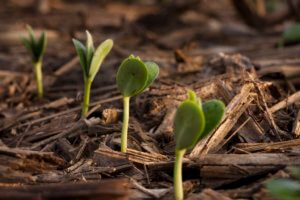
BASF, the world’s leading producer of plant protection agents, plans to increase its share of the Ukrainian market of plant protection agents in 2018 by 1.5-2 percentage points with the acquisition of business shares and assets of the German chemical company Bayer, to 17-17.5%. “We are planning to increase the share of the Ukrainian market of plant protection products by 1.5-2%. At present the company has a 15.5% stake in Ukraine,” Head of the BASF Agribusiness Department in Ukraine, Moldova and the Caucasus Tiberiu Dima said.
He specified that BASF intends to keep the share of the Ukrainian seed market next year at the level of 8-9%. “We also intend in the first ten days of October to officially open a research seed center for working with grains in the village of Tsentralne in Kyiv region, which was purchased from Bayer,” the expert noted.
It is part of a global network of research centers. Already in the near future the center will close the full cycle of seed production: from the creation of new varieties of wheat to the presentation of developments in the demonstration center.
BASF is the world’s leading manufacturer of plant protection products. The product portfolio consists of five segments: chemicals, special products, functional materials and solutions, solutions for agriculture, as well as oil and gas.